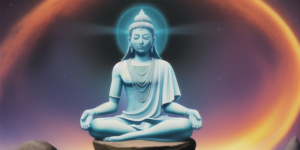Let us embark on a journey to the heart of Buddhism, to explore a concept that is central to the cultivation of goodness and spiritual growth: the accumulation of merits. Allow your heart to be as open as the sky, and your mind as fertile as the earth, as we contemplate this profound teaching.
What are merits in Buddhism?
Merits, in Buddhism, are like radiant beams of sunlight that touch and nurture the hearts of beings. Imagine a garden in bloom, with flowers of compassion, trees of wisdom, and rivers of joy. The cultivation of this garden within us is what accumulating merit is all about.
Now, let us clarify what merits are. In Buddhism, merits simply mean sharing your joy with others. It is about extending ourselves beyond the sphere of our own wants and needs and participating in the well-being of others. It is a call to elevate ourselves above the primal instincts that keep us bound to a narrow sense of self, and instead embrace a broader vision that encompasses all sentient beings.
In essence, accumulating merit means sacrificing, in an uncalculated way, our own comfort to help others achieve self-actualization. This can manifest in countless ways; not just through monetary means, but also through sharing knowledge, imparting skills, or any creative endeavor that can guide others on the spiritual path.
The Misunderstood Aspect of Monetary Donations
It’s important to address a common misunderstanding regarding merits and monetary donations. The essence of a donation lies not in the money itself, but in the experiences and opportunities it can create for others. Let me illustrate with an example.
Imagine that your monetary donation is used to purchase food for the hungry. The nourishment that fills their stomachs is not just a fulfillment of a basic need; it is an experience of relief, contentment, and gratitude. This experience is akin to planting a seed in their hearts. Even if it is for a brief moment, this seed has the potential to blossom into a quest for higher fulfillment, steering them towards self-actualization.
Likewise, when donations are used by organizations to publish books or create amulets, these items become vessels of inspiration, floating across the sea of humanity and reaching the shores of countless hearts. Through these objects, individuals may find the spark that ignites their spiritual journey.
The Significance of Reach Over Amount
Let us also reflect on the notion that the amount of our donation or act is not the measure of its merit. The true worth lies in the number of lives we touch and the ripples we create in the ocean of existence. A small act of kindness can set into motion a wave of goodness that knows no bounds.
Merits in Buddhism are like fragrant flowers that we offer at the altar of humanity. They are acts of selflessness that nourish the spiritual growth of ourselves and others. Through the sharing of joy, knowledge, and resources, we not only enrich the lives of those around us but also plant seeds of wisdom and compassion in the fertile grounds of our own hearts.
Merits, in the Buddhist sense, are energies that weave the fabric of our existence. Imagine a river of light flowing through and around you, constantly taking and giving. Yet, this energy is not something that can be caught under a microscope or calculated in a physics lab. This is a domain that stretches beyond the boundaries of science, for it is woven into the very nature of being, not as particles or waves, but as sublime currents that ebb and flow with our thoughts, words, and actions. It is in the realm of the unknowable.
You might ask: “But why is it that I do so much good, and yet misfortune haunts my doorstep?” This, dear soul, is where we must ponder on the nature of ‘bad’ and ‘good’. When an event doesn’t match our immediate desires, we often hastily label it as ‘bad’. However, these experiences are akin to the gardener nurturing the seed. The tree does not bear fruits immediately. It requires the incessant flow of time, care, patience, and undeterred dedication.
Just as different seeds blossom at different times, the merits of our deeds unfurl across the tapestry of life in a myriad of ways. Sometimes, the sprouting might take longer than expected; sometimes the fruits may be savored by generations to come. The manifestation of merits is not limited to our own temporal existence.
Yet, life is not a garden devoid of challenges. There will be storms that batter the leaves, pests that challenge the roots. These are not ‘bad’ occurrences but rather, an invitation to learn, evolve, and fortify both ourselves and our garden. Every hardship carries within it a potential seed for a greater good.
Now, let us talk about expectations. Expectations are like chains that bind the soul. When we perform an act of kindness or charity with expectations, we are essentially bargaining with the universe. Our minds, however creative, are limited by past experiences and knowledge. Expectations cloud our minds with pictures painted with yesterday’s colors.
When we let go of these expectations, we create space for the boundless to enter. Without the chains of anticipated outcomes, we make room for the inexplicable, the beautiful, the divine to manifest. Imagine your consciousness as a vessel. The less clutter of expectations it has, the more room there is for the light of merits to fill.
Accumulation of Merits
First, let us explore the ways to accumulate and increase the capacity of merits. In Buddhism, merits are positive karmic results achieved through acts of generosity, morality, and cultivation of wisdom. It is essential to understand that as we practice generosity, uphold moral conduct, and meditate, we are not just benefitting ourselves, but we are contributing to the collective well-being of all sentient beings.
Now, let’s envision merit accumulation as going to the gym, but on a subtler plane. In a gym, you exercise your muscles and over time, they grow stronger. Similarly, through consistent acts of kindness and compassion, you exercise your heart and mind, and they grow in strength and capacity to love. When you lift weights, your muscles may tear, but this leads to them becoming bigger and stronger. Much like this, when you sacrifice some comfort for the sake of others, your inner capacity to carry the weight of compassion expands.
One might wonder, how can we stretch our heart muscles in the way we stretch our physical muscles? Take a moment and observe how much comfort you are seeking in life. What if we could share a little of that comfort with someone else? The Buddha taught that even the simplest acts, such as offering a warm smile or a kind word, are deeply meritorious. It is through mental strength, rather than physical, that we can go that extra mile for others.
Let us now touch upon the role hardships play in building this capacity for merit. Life’s storms and trials, though at times seeming unbearable, are in truth forging a deeper resilience and fortitude within us. Just as the blacksmith’s hammer shapes and strengthens the metal, hardships shape our inner beings and deepen our compassion. As we learn to weather life’s storms, our capacity for understanding and empathizing with the sufferings of others grows. Through this alchemy of experience, we can perceive hardships as opportunities to cultivate wisdom and deepen our merits.
Yet, must we always wait for hardships to befall us to grow?
Let us rather be proactive in our spiritual cultivation. Let us not wait for life to throw challenges our way, but let us actively seek to push our mental barriers and give more of ourselves. Whether it be through a listening ear, a shared meal, or a shoulder to cry on, let us be generous with our time and love. By doing so, we not only enrich our own lives but we also contribute to the well-being of the world around us.
Merits in Buddhism are like spiritual muscles, built through consistent acts of kindness, moral uprightness, and contemplation. Hardships and selfless acts act as the weights that strengthen these muscles. Let us embrace our hardships and always strive to stretch our mental boundaries in the service of others, thus cultivating a reservoir of merits that will guide us along the noble path towards enlightenment.





